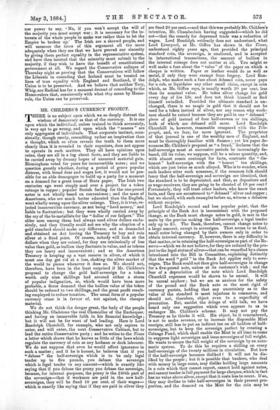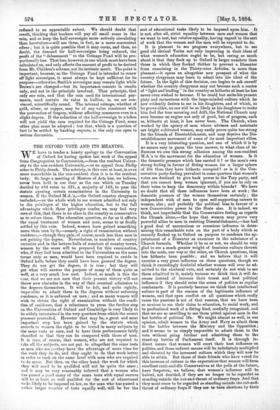MR. CHILDERS'S CURRENCY PROJECT.
THERE is no subject upon which we so deeply distrust the wisdom of democracy as that of the currency. It is one upon which the individual, unless trained to think accurately,
is very apt to go wrong, and upon which the " masses " are only aggregates of individuals. That corporate instinct, occa- sionally, though rarely, resembling rather an inspiration than a thought, which so often reveals the truth to them more clearly than it is revealed to their superiors, does not appear to operate in such matters. They all have opinions upon coins, they are all in a fog about facts, and they are liable to be carried away by dreamy hopes of unearned material gain.
Birmingham voted for years for inconvertible notes ; and we question greatly whether, during a period of grave popular distress, with bread dear and wages low, it would not be pos- sible for an able demagogue to build up a party for a moment on a demand for a great issue of State paper. The Irish two centuries ago went simply mad over a project for a token coinage in copper ; popular Scotch feeling for the one-pound notes is not wholly based on convenience ; and the mass of Americans, who are much better educated than the English, went wholly wrong upon the silver coinage. They, it is true, re- jected inconvertible currency, as not being "hard money," and liable to fluctuation ; but they were wholly carried away by the cry of the bi-metallists for the "dollar of our fatlers." The older men among them had always used silver dollars exclu- sively, and they literally could not see why the adoption of a gold standard should make any difference, and so demanded and obtained an Act forcing the Treasury to buy and coin silver at a fixed pike. Of course, nobody will look at the dollars when they are coined, for they are intrinsically of less value than gold, as bullion they fluctuate in value, and as tokens they are heavy and inconvenient ; and so the American Treasury is heaping up a vast reserve in silver, of which it must one day get rid at a loss, shaking the silver market of the world to pieces whenever it does so. We should not, therefore, have been in the least surprised if Mr. Childers's proposal to change the gold half-sovereign for a token worth only nine shillings had aroused either a storm of popular indignation, or, which would have been more probable, a fierce demand that the bullion value of the token should be reduced to two shillings, and the great profit result- ing employed to reduce taxation. The usual form of a popular currency craze is in favour of, not against, the cheaper material.
We do not think the danger great, the body of the people thinking Mr. Gladstone the real Chancellor of the Exchequer, and having an immovable faith in his financial knowledge ; but it will not be for want of bad leading. Here is Lord Randolph Churchill, for example, who not only aspires to enter, and will enter, the next Conservative Cabinet, but to lead the entire Conservative party ; and he writes to the Times a letter which shows that he knows as little of the laws which regulate the currency of coin as any hodman or dock labourer. We do not suppose that even he would affect ignorance in such a matter ; and if he is honest, he believes that if you " debase " the half-sovereign which is to be only legal tender up to five pounds, you debase the sovereign which is legal tender to any amount—which is exactly like saying that if you debase the penny you debase the sovereign, because, for internal purposes, the penny is the 240th part of the sovereign—that if workmen are paid in the new half- sovereigns, they will be fined 10 per cent, of their wages—. which is exactly like saying that if they are paid in silver they
are fined 20 per cent.—and that this was probably Mr. Childers's intention, Mr. Chamberlain having suggested—which he did
not—that the remedy for depressed trade was a reduction of wages.Lord Randolph evidently does not understand. what Lord Liverpool, as Mr. Giffen has shown in the Times, understood eighty years ago, that provided the principal standard coin, the sovereign, is unaltered, and is accepted
in international transactions, the amount of bullion in the internal coinage does not matter at all. You might as well make a fuse about the " value " of the paper on which a cheque is written. Paper or leather would do as well as metal, if only they were exempt from forgery. Lord Ran- dolph, who makes such a fuss about debased coin, never pays for a cab, or liquidates any other small claim, except in coin which, as Mr. Giffen says, is usually worth 20 per cent, less than its nominal value. He takes silver change for gold every day of his life, and does not think himself or find himself swindled. Provided the ultimate standard is un- changed, there is no magic in gold that it should not be used for a token instead of silver, nor any reason why work- men should be ruined because they are paid in one "debased" piece of gold instead of four half-crowns or ten shillings, both of which are debased still more. Lord Randolph
Churchill is, however, reasonable compared with the Tele- graph, and, we fear, far more ignorant. The proprietor
of that journal is one of the wealthy men of England, and must be thoroughly familiar with finance ; yet his paper de- nounces Mr. Childers's proposal as "a fraud," declares that the half-sovereign must at successive periods be increasingly de- based, till its value, we suppose, will be a minus quantity, and, with almost comic contempt for facts, contrasts the " dis- honest " half-sovereign with the "honest " ten shillings, which are just twice as much alloyed. Who is to wonder, when such leaders utter such nonsense, if the common folk should fancy that the half-sovereign and sovereign are identical, that the standard is to be depreciated, and that, as depositors and as wage-receivers, they are going to be cheated of 10 per cent ?
Fortunately, they will trust other leaders, who know the exact facts, and they are accustomed to" debased " silver and copper ; but we should, with such examples before us, witness a delusion without surprise.
Lord Randolph's second and less popular point, that the principle of the Bank Act is inconsistent with the proposed change, as the Bank must change notes in gold, is met in the main by the proviso making the half-sovereign a legal tender only up to £5. The Bank, therefore, cannot change notes to
a large amount, except in sovereigns. That seems to U8 final,
small notes being changed by their owners only in order to obtain internal currency. If, however, there is any difficulty in that matter, or in retaining the half-sovereigns as part of the Re- serve—which we do not believe, for they are reduced by the pro- ject to the legal status of silver—that can be remedied by a clause introduced into the Bill in Committee, explaining distinctly that the word " gold" in the Bank Act applies only to sove- reigns. The Bank could not then give half-sovereigns in change for a five-pound note, unless at its customer's wish ; and the fear of a depreciation of the note which Lord Randolph Churchill expresses would be shown to be unreal. It will be unreal anyhow ; but we are as anxious for the safety of the pound and the Bank note as the most rigid of currency purists, holding that any uncertainty as to the value of the standard is most injurious to commerce, and should not, therefore, object even to a superfluity of precaution. But, amidst the deluge of wild talk, we have heard only one suggestion which even appears to us to endanger Mr. Childers's scheme. It may not pay the Treasury as he thinks it will. His object, be it remembered, is not to make revenue, or to increase the disposable Mint receipts, still less to put an indirect tax on all holders of half- sovereigns, but to keep the sovereign perfect by creating a Coinage Fund, which shall enable the Mint in all tune to come to suppress light sovereigns and issue sovereigns of full weight. He wants to secure the full weight of the sovereign by an auto- matic system. To do this he requires a shilling on every half-sovereign of the twenty millions in circulation. But how if the half-sovereign becomes disliked ? It will not be dis- liked by the people ; but it is possible that bankers, who deal with money in large sums, may dislike holding large amounts in a coin which they cannot export, cannot hold against notes, and cannot tender in full payment for large cheques, which in fact has no value above silver, except that it costs less to count. If so, they may decline to take half-sovereigns in their present pro- portion, and the demand on the Mint for the coin may be reduced to an appreciable extent. We should doubt that result, thinking that bankers will pay all small sums in the coin, and so keep the half-sovereigns more actively circulating than heretofore—will use them, in fact, as a more convenient silver ; but it is quite possible that it may occur, and then, no doubt, the demand for half-sovereigns being reduced, the profit of the " debasement " to the Coinage Fund will be pro- portionally less. That loss, however, is one which must have been calculated on, and only affects the amount of profit to be derived from Mr. Childers's scheme, not its intrinsic merit. The point is important, because, as the Coinage Fund is intended to renew all light sovereigns, it must always be kept sufficient for its purpose—otherwise, Smith's sovereigns may remain light while Brown's are changed—but its importance consists in results only, and not in the principle involved. That principle, that only one coin, and that the coin used for international pay- ments, need contain its value in bullion, is, we are con- vinced, scientifically sound. The internal coinage, whether of gold, silver, or copper, may be of any value consistent with the prevention of forgery, without affecting commerce even in a slight degree. If the reduction of the half-sovereign to a token will not yield the sum required for the Coinage Fund, some other plan must be adopted ; but that, which is a question of fact to be settled by banking experts, is the only one open to serious discussion.



































 Previous page
Previous page